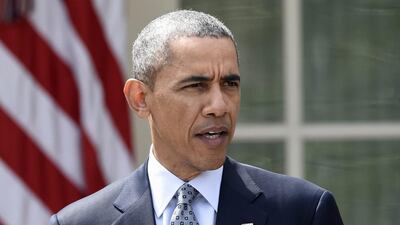Critics of Barack Obama’s foreign policy have long complained how hard it is to discern what it actually is. Statements by the US president, such as one he made in an interview in February, have not satisfied them: “You take the victories where you can. You make things a little bit better rather than a little bit worse. That’s just a realistic assessment of how the world works.”
Many might agree that that is indeed realistic, but questions remain as to whether Mr Obama has a coherent, consistent overall vision in international affairs.
This week Mr Obama provided greater illumination. In an interview with Thomas Friedman of the New York Times, he said: “You asked about an Obama doctrine. The doctrine is: We will engage, but we preserve all our capabilities.”
He was speaking in relation to Iran, but Cuba also came up in the conversation. The doctrine appears to be cautious, as is to be expected from a president frequently criticised for being professorial rather than passionate.
But its caution rests on confidence that American military might remains so great that no country can seriously imagine waging war on the US and winning. “We are powerful enough to be able to test these propositions without putting ourselves at risk,” concluded Mr Obama.
The doctrine isn’t quite realpolitik. But it is notable that the president’s discussion was devoid of airy rhetoric about democracy and human rights. Rather than framing US foreign policy as the unilateral enforcement of universal values (Western defined ones, naturally), Mr Obama said it was about advancing American core interests.
He then identified those interests in the Middle East as being “that everybody is living in peace, that it is orderly, that our allies are not being attacked, that children are not having barrel bombs dropped on them, that massive displacements aren’t taking place”.
Peace. Order. Persistent diplomacy. It certainly fits with the “no drama Obama” image. It is also consistent with many actions that his administration has taken.
The US has, for instance, made pro forma comments of concern about non-democratic interventions, such as the army takeover in Thailand last May.
But protestations by officials, publicly and privately, that they really are troubled by deviations from legal norms, should be taken with a large ladle of salt.
The message has gone out that the maintenance of internal stability in countries that are historic allies, and their continued partnership with the US, are more important than domestic politics.
The same goes for Egypt, where the White House’s attempt not to call the overthrow of President Morsi a “coup” tested semantic limits. But the US rightly views President Sisi as an ally in the fight against extremism and a more stable leader. So just recently, the arms freeze imposed after Mr Sisi came to power was lifted, and the annual $1.3 billion in military aid will also go through as normal.
This realism may be hard-headed, but it is not cold. In the case of Iran, Mr Obama understands that “even those who we consider moderates and reformers are supportive of some nuclear programme. What we know is that this has become a matter of pride and nationalism ”.
To the extent that the Obama Doctrine is based on a greater understanding that different countries may have their own value systems and historic goals of which they are proud, is to be applauded. With a Kenyan father and having grown up partly in Indonesia, perhaps Mr Obama is innately disposed to perceive such cultural nuances better than most of his countrymen.
Many of them, however, will not be convinced that the Obama Doctrine adds up to nearly enough.
His critics are both to his left and to his right. Liberal interventionists and neoconservatives would like to see a far more muscular foreign policies. the former lamenting a Democratic president’s unwillingness to be more forceful on human rights issues, the latter bemoaning American “weakness”.
The real problem with the Obama Doctrine, however, is that it hasn’t been evenly or far-reachingly enough applied.
It would have been difficult, but if the US president was really serious about engagement with his Russian counterpart, Vladimir Putin, any firm words and gestures of irritation should have been kept behind closed doors. Public enmity serves neither country and makes it harder for either to soften their stance without losing face.
The doctrine is a step back, especially from George W Bush’s adventurism. But that is no more than a sensible recognition of the US’s changing place in an increasingly multipolar world.
President Obama was quite right to say in 2009 that “any world order that elevates one nation above others cannot long survive”. Inasmuch as the Obama Doctrine is the culmination of that approach, it deserves applause. Cautious applause, naturally. Anything more enthusiastic than that wouldn’t quite fit with either the policy or the man.
Sholto Byrnes is a Senior Fellow at the Institute of Strategic and International Affairs, Malaysia


